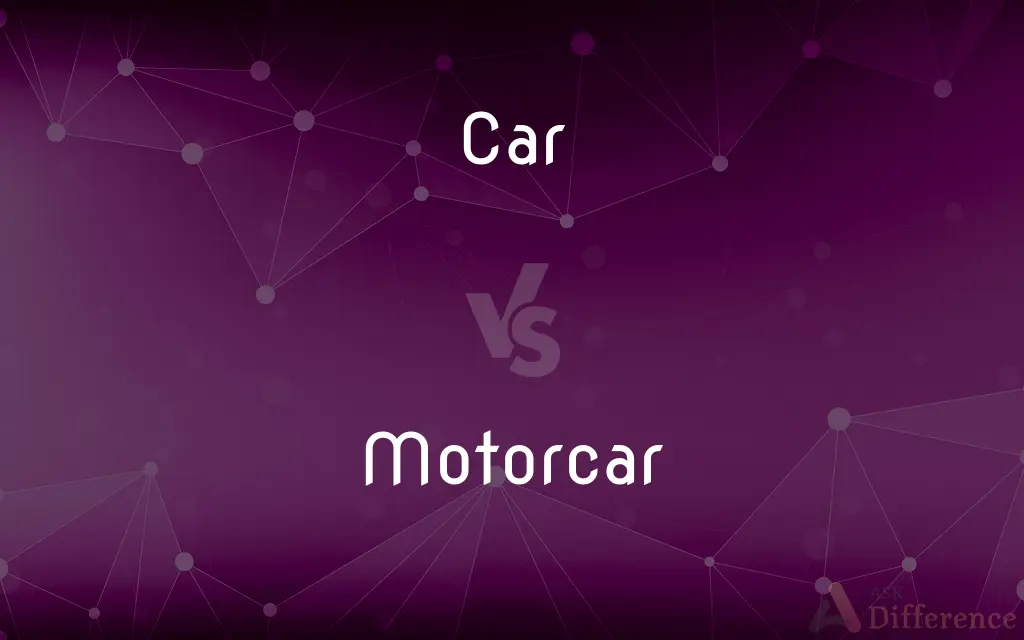Car vs. Motorcar — What's the Difference?
By Tayyaba Rehman & Fiza Rafique — Updated on May 6, 2024
Car and motorcar refer to the same vehicle; "car" is the more commonly used term, especially in American English, whereas "motorcar" sounds more formal and is less frequently used.

Difference Between Car and Motorcar
Table of Contents
ADVERTISEMENT
Key Differences
The term "car" is universally recognized and widely used in everyday language to describe a wheeled motor vehicle used for transporting passengers. Whereas, "motorcar" is a term that is often considered more formal and is less commonly used in casual conversation. It carries an old-fashioned tone that can be associated with early automotive history.
In American English, "car" is the standard word used in both spoken and written language. On the other hand, "motorcar" might be found more frequently in British English or in historical contexts, reflecting its usage during the early 20th century when automobiles were becoming popular.
The simplicity of the term "car" makes it more accessible and relatable to a broad audience. While "motorcar" might evoke a sense of nostalgia or formality, which could be preferred in specific literary or historical discussions.
Marketing and media typically use "car" because of its brevity and familiarity. In contrast, "motorcar" might be used to impart a classic or luxurious connotation, especially in marketing vintage or classic car shows.
Legal and technical documents are more likely to use "car" due to its universal understanding. Whereas, "motorcar" may appear in legal documents or discussions that intentionally reflect older language or are based in regions where this term remains in formal use.
ADVERTISEMENT
Comparison Chart
Common Usage
Very common
Less common
Connotation
Neutral, modern
Formal, nostalgic
Prevalence in Language
Predominantly in all forms of English
More frequent in British English or historical texts
Usage in Media
Widely used
Rarely used
Tone
Casual
Formal
Compare with Definitions
Car
A road vehicle with an engine, four wheels, and seats for a small number of people.
She drove her car to the supermarket.
Motorcar
Sometimes used to denote luxury or classical aspect in vehicles.
The auction featured classic motorcars from the 1920s.
Car
A separate section of a train devoted to a specific purpose.
The dining car was full of passengers.
Motorcar
Used in legal or formal documents to specify a type of vehicle under discussion.
The defendant was accused of operating a motorcar while intoxicated.
Car
A cart for a specific use, such as a golf cart.
He loaded his golf bags into the car.
Motorcar
A four-wheeled automotive vehicle used for transporting passengers; synonym for automobile.
They took an old motorcar for a spin at the vintage car rally.
Car
Informal usage referring to any wheeled vehicle.
The new electric cars are very efficient.
Motorcar
A term used in contexts emphasizing the distinction from other types of cars like electric cars or rail cars.
His collection includes several petrol-powered motorcars.
Car
A vehicle moved on a rail, especially a railroad car.
The last car of the train is usually less crowded.
Motorcar
Historically, referred to early vehicles with a motor, distinguishing them from horse-drawn carriages.
The museum features motorcars from the dawn of automotive engineering.
Car
A car (or automobile) is a wheeled motor vehicle used for transportation. Most definitions of cars say that they run primarily on roads, seat one to eight people, have four wheels, and mainly transport people rather than goods.Cars came into global use during the 20th century, and developed economies depend on them.
Motorcar
See automobile.
Car
An automobile.
Motorcar
An enclosed passenger motor vehicle, a car, powered by an engine.
Car
A vehicle, such as a streetcar, that runs on rails
A railroad car.
Motorcar
A self-propelled railway vehicle
Car
A boxlike enclosure for people or cargo on a conveyance
An elevator car.
Motorcar
4-wheeled motor vehicle; usually propelled by an internal combustion engine;
He needs a car to get to work
Car
The part of a balloon or airship that carries people or cargo.
Car
(Archaic) A chariot, carriage, or cart.
Car
A wheeled vehicle that moves independently, with at least three wheels, powered mechanically, steered by a driver and mostly for personal transportation.
She drove her car to the mall.
Car
(dated) A wheeled vehicle, drawn by a horse or other animal; a chariot.
Car
A four-wheeled cab, as opposed to a (two-wheeled) Hansom cab.
Car
An unpowered unit in a railroad train.
The conductor coupled the cars to the locomotive.
Car
(rail transport) an individual vehicle, powered or unpowered, in a multiple unit.
The 11:10 to London was operated by a 4-car diesel multiple unit.
Car
(rail transport) A passenger-carrying unit in a subway or elevated train, whether powered or not.
From the frontmost car of the subway, he filmed the progress through the tunnel.
Car
A rough unit of quantity approximating the amount which would fill a railroad car.
We ordered five hundred cars of gypsum.
Car
The moving, load-carrying component of an elevator or other cable-drawn transport mechanism.
Fix the car of the express elevator - the door is sticking.
Car
The passenger-carrying portion of certain amusement park rides, such as Ferris wheels.
The most exciting part of riding a Ferris wheel is when your car goes over the top.
Car
The part of an airship, such as a balloon or dirigible, which houses the passengers and control apparatus.
Car
(sailing) A sliding fitting that runs along a track.
Car
The aggregate of desirable characteristics of a car.
Buy now! You can get more car for your money.
Car
(US) A floating perforated box for living fish.
Car
A clique or gang.
Car
(obsolete) A turn.
Car
(programming) The first part of a cons in Lisp. The first element of a list.
Car
A small vehicle moved on wheels; usually, one having but two wheels and drawn by one horse; a cart.
Car
A vehicle adapted to the rails of a railroad.
Car
A chariot of war or of triumph; a vehicle of splendor, dignity, or solemnity.
The gilded car of day.
The towering car, the sable steeds.
Car
The stars also called Charles's Wain, the Great Bear, or the Dipper.
The Pleiads, Hyads, and the Northern Car.
Car
The cage of a lift or elevator.
Car
The basket, box, or cage suspended from a balloon to contain passengers, ballast, etc.
Car
A floating perforated box for living fish.
Car
4-wheeled motor vehicle; usually propelled by an internal combustion engine;
He needs a car to get to work
Car
A wheeled vehicle adapted to the rails of railroad;
Three cars had jumped the rails
Car
A conveyance for passengers or freight on a cable railway;
They took a cable car to the top of the mountain
Car
Car suspended from an airship and carrying personnel and cargo and power plant
Car
Where passengers ride up and down;
The car was on the top floor
Common Curiosities
Why is "car" more commonly used than "motorcar"?
"Car" is shorter, more modern, and fits better into everyday language, making it more prevalent.
Are "car" and "motorcar" interchangeable?
Yes, the terms can be used interchangeably, though "motorcar" might sound more formal or outdated.
What is a car?
A car is a wheeled vehicle that is motorized and primarily used for transporting people.
What might be a context where "motorcar" is preferred over "car"?
In historical writing, formal discussions, or when specifically referring to vehicles from the early 20th century, "motorcar" is often preferred.
What is a motorcar?
A motorcar is another term for a car, often implying a more formal or historical context.
What impact does the choice between "car" and "motorcar" have in literature?
Using "motorcar" in literature can set a historical or formal tone, suggesting a setting in the past or a more refined narrative style.
In what type of writing would "motorcar" be more appropriate than "car"?
"Motorcar" might be more appropriate in formal writing, historical accounts, or when a specific vintage context is desired.
How do dictionaries define "car" versus "motorcar"?
Most modern dictionaries define "car" as the standard term for a motor vehicle used for transportation, while "motorcar" might be noted as a synonym or an archaic or formal variant.
Are there industries that still use "motorcar" frequently?
Industries related to classic and vintage automobiles may still use "motorcar" frequently to evoke a sense of history and nostalgia.
What synonyms are common for "car" and "motorcar"?
Common synonyms for both include "automobile" and "vehicle," though these can have slightly broader meanings.
How do translations handle "car" and "motorcar"?
In translations, "car" is generally translated into the standard word for a motor vehicle in other languages, while "motorcar" may require additional context or footnotes to convey its formal or historical tone.
What future does the term "motorcar" have in English language usage?
"Motorcar" may continue to be used in niche areas such as in discussions of classic cars, in formal or legal contexts, or in literature, but it is unlikely to regain mainstream usage.
How do non-native English speakers learn these terms?
Non-native speakers are typically taught "car" as the primary term in English language courses, with "motorcar" introduced later if at all.
What vintage eras most commonly used "motorcar"?
The term "motorcar" was most commonly used during the early 20th century when automobiles were a new technology.
Is there a regional preference for using "motorcar"?
"Motorcar" may still be somewhat more preferred in British English compared to American English, where "car" is overwhelmingly the common usage.
Do legal terms still use "motorcar"?
Some legal documents, especially older ones or those dealing with specific types of legislation, might still use "motorcar."
Share Your Discovery

Previous Comparison
Shawl vs. Shaw
Next Comparison
Suicide vs. EuthanasiaAuthor Spotlight
Written by
Tayyaba RehmanTayyaba Rehman is a distinguished writer, currently serving as a primary contributor to askdifference.com. As a researcher in semantics and etymology, Tayyaba's passion for the complexity of languages and their distinctions has found a perfect home on the platform. Tayyaba delves into the intricacies of language, distinguishing between commonly confused words and phrases, thereby providing clarity for readers worldwide.
Co-written by
Fiza RafiqueFiza Rafique is a skilled content writer at AskDifference.com, where she meticulously refines and enhances written pieces. Drawing from her vast editorial expertise, Fiza ensures clarity, accuracy, and precision in every article. Passionate about language, she continually seeks to elevate the quality of content for readers worldwide.











































